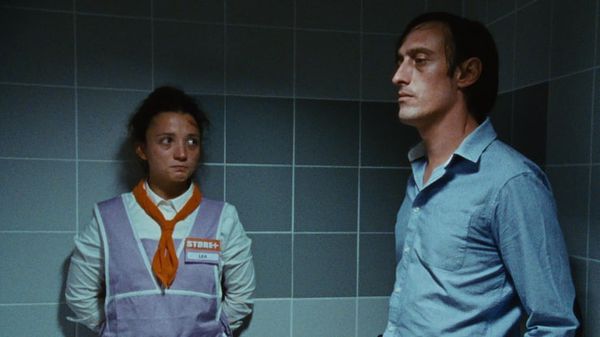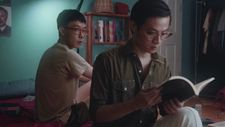 |
| international Audience Award winner Store Policy |
Glasgow Short Film Festival's 14th (and second wholly online) edition completed this evening. With a traditionally varied programme of events and films it set a new attendance record, with approximately 5,800 viewers across the showings, or 150 per programme.
That figure is more than can - even uncomfortably - fit in many of GSFF's traditional haunts. Those watching the awards ceremony were treated to visions of the GFT, CCA, past festival hubs up on the other side of the motorway, even the 2020 festival mural that's on the other side of the river down by the Tradeston loop I think. That mural was created for the 2020 festival opening, an all-singing all dancing number. Social distancing requirements meant that wouldn't fly this time around, but we still got a glimpse.
Last year's audience award winner James Price was responsible for the festival trailer. Featuring television (and Hogmanay stalwart) Jonathon Watson and with tongue more than slightly in cheek it was itself a charming (if diddy) wee film. Watson would return as MC for the festival awards ceremony, and eagle-eyed viewers would have spotted Pricey woz there if they were paying Spider-man levels of attention to the whiteboard.
The opening ceremony this time was provided by another GSFF regular, Will Anderson. Festival directors Matt Lloyd and Sanne Jehoul had a touch of the Terence & Philips to them in an animated (and chaotic) film. Will himself made an appearance, doing for greenscreen couture what even Taika Waititi couldn't.
 |
| Red Aninsri; Or, Tiptoeing On The Still Trembling Berlin Wall |
The opening screenings included past Bill Douglas winner Green Screen Gringo, as well as others from across the programming, including canine themed Big Dog Energy. There was also a, well, site specific video essay about Lockdown by Jessica McGoff, one of the Black Spatial Imaginaries selections amongst others.
In a place where there might have been a festival diary the online nature of it means that I shan't bore you with going from my sofa to my kettles and back. I can talk about the quality of the discussion events, I was glad to catch Doing No Harm which featured Rosy Barnes,, Simone Pereira Hind and Austen McCowan, who each had films at GSFF 2020, and was hosted by Hannah Currie who won GSFF 19 Scottish Audience Award with We Are All Here. The discussion was wide ranging and well managed, with live subtitling. I also appreciated industry and discussion events that were available after the fact. While I caught it live, if not entirely awake, being able to time-shift it and other parts of programming was in and of itself of tremendous utility in supporting audiences with mental health issues. Anyone who's been to a festival will know the dread of someone making more of a comment than a question, but moderating it through twitter/email aforehand removed that and, frankly, improved the experience.
GSFF might be the first film festival to do a second entirely online outing, and they are to be commended for the quality of the offering. In addition to the availability of the industry stuff after the fact, the Q&A presentations solved a series of problems. Scheduling is ever an issue at festivals, indeed the awards ceremony would start about 15 minutes late and at one point accuse me of being in the wrong territory to view it. However being able to speak to Scottish competition directors en masse without worrying about getting chased off stage for some club night was refreshing. Even more so for those with the Bill Douglas award - each film I saw had a director interview afterwards, well subtitled, translated even where appropriate, adding depth to the screenings in a way that is at best difficult in 'ordinary' circumstances.
As part of the Bill Douglas 10th anniversary there was a screening of the nine previous winners, all worthy. Also an accompanying podcast, and indeed this timeshifting interview process was for me another triumph.
There were other highlights. Festival director's wean Oran Lloyd provided the introduction (and ground rules) for the kids' shorts. Free to watch through the festival, commending the suggestion to "remember not to bring any stuff that will distract you. And also no toys, unless you get distracted unless you're allowed to have toys". That's neurodiversity inclusive without calling attention to it, supportive to kids and adults both, and sufficiently good that I can only hope there was greater reward for the turn than a melting ice-cream cone (not even a 99!).
 |
| Expensive Shit |
Though there was a dog specific programme there were plenty of cats, which are better. I particularly enjoyed the director interview where what I thought was a lampshade turned out to be a cat tree when a fluffy tail appeared over its edge.
The awards were hosted by Jonathan Watson as stated, and there were some real comic gems. An observation about the benefits of online ceremonies in that potential outcomes don't narrow "as soon as you see the table plan". Thanking the "entire team" but wondering if you could use that label for "a few vegans" the closing sequence started. Festival volunteers and the Cheers theme, including all the verses usually elided for re-runs, and then Matt Lloyd's effusive thanks from an arts-body funded hostage bunker, a structure in which co-director Sanne Jehoul also appeared to be held at a social distance.
The awards were rattled through quite quickly - after the technical difficulties - with the International categories first. Store Policy, a delicately constructed and frankly harrowing document of corporate inhumanity won the International Audience award. The Bill Douglas jury gave the observational documentary Hunstville Station a special mention, but unanimously awarded Red Aninsri; Or, Tiptoeing On The Still Trembling Berlin Wall the prize. Ratchapoom Boonbunchachoke's film left them "cheering in awe", and it's a deserving winner.
The Scottish Audience award went to Expensive Shit, like Store Policy a film informed by an intersectional feminism and tremendous ability both in front of and behind the camera.
The Scottish jury awarded two special mentions, to Green Thoughts and Sudden Death, each in their own way informed by landscape. They also were in absolute agreement about the winner, saying "[it was a] film that would be great in any time period, but its depiction of the vicious circle of exploitation feels particularly relevant to this moment." That winner was Expensive Shit, making it the first film to achieve that double. In 2016 A Short Guide To Re-Entry won both the audience and jury award in the International competition, and Expensive Shit absolutely deserves to be in that company.
Further to the heartfelt thanks to and from the juries and festival organisers there were many wishes to see folk and films in the flesh and flicker of the theatre next year. We can at the moment only hope, but anticipation is building. I know that my blue letter will be a harbinger of red carpets to come, but I also hope that lessons and opportunities afforded by the online editions will be carried over.
Matchbox Cineclub have done phenomenal work with subtitling of both live and recorded elements. The ability to timeshift and the scheduling benefits of director Q&A pre-records are palpable, and I hope they continue. The filmchief platform is one of the most straightforward that I've used, and I'd love it if festival winners were available online for a while after an in-person festival. As with all these things it's rarely the technical but the legal that's the issue, but I really hope precedents set by GSFFs online are carried over.





















